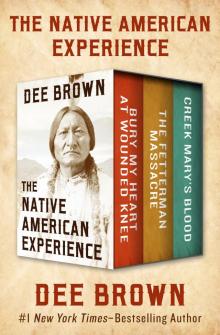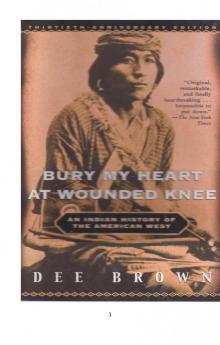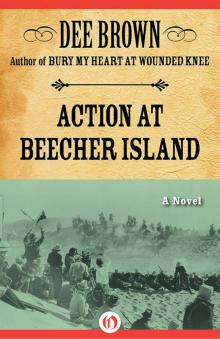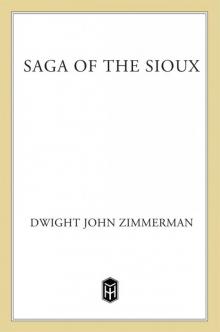Action at Beecher Island: A Novel Read online
Action At Beecher Island
A Novel
Dee Brown
Contents
Foreword
1 Lieutenant Frederick Beecher
2 Abner (Sharp) Grover
3 Major George (Sandy) Forsyth
4 Jack Stilwell
5 Sigmund Schlesinger
6 Martin Burke
7 Abner (Sharp) Grover
8 Lieutenant Frederick Beecher
9 Major George (Sandy) Forsyth
10 Two Crows
11 Major George (Sandy) Forsyth
12 Two Crows
13 Roman Nose
14 Jack Stilwell
15 Two Crows
16 Sigmund Schlesinger
17 Major George (Sandy) Forsyth
18 John Donovan
19 Trooper Reuben Waller
20 Captain Louis Carpenter
21 Major George (Sandy) Forsyth
A Biography of Dee Brown
Foreword
THIS STORY OF THE nine-day siege of Forsyth’s Scouts by Plains Indians at Beecher Island in September 1868 is based upon reports, diaries, letters, and accounts of participants. Each man who experienced the ordeal at Beecher Island saw or remembered it in a different way; therefore it is presented here from the varying viewpoints of Lieutenant Frederick Beecher, Chief-of-Scouts Abner (Sharp) Grover, Major George Forsyth, Jack Stilwell, Sigmund Schlesinger, Martin Burke, Two Crows, Roman Nose, John Donovan, Reuben Waller, and Captain Louis Carpenter.
Interviews with surviving Indians, accounts of Scouts Thomas Ranahan, Eli Ziegler, Thomas Murphy, John Hurst, George Oakes, Chauncey Whitney, A. J. Pliley, Louis McLaughlin, James J. Peate, Chalmers Smith, and official records and reports of the War Department are supporting sources.
Whenever possible the dialogue—which is introduced for dramatic effect and to forward the action—is in words recorded by witnesses or participants.
1
Lieutenant Frederick Beecher
May 1868
A GUST OF WIND swept through the open door of the quartermaster’s office, lifting papers from Lieutenant Frederick Beecher’s battered desk. He patiently retrieved them from the floor, weighting them down with a piece of polished pink sandstone. The wind had brought with it an aroma of springtime, and when Beecher looked across the Fort Wallace parade ground to the sloping prairie beyond, he could see a shimmer of greening buffalo grass.
Anywhere else, he thought, spring was a welcome season, but around Fort Wallace it usually meant Indian troubles. The buffalo herds were moving north to graze, and hostile bands of Cheyennes and Sioux would soon be coming down from their winter camps to hunt. After the hunts would come the raiding parties—against settlers, ranchers, railroad construction crews, wagon trains and stagecoaches. Last summer Roman Nose had boldly challenged the fort itself, and only a valiant stand by a company of the 7th Cavalry had saved it from disaster.
Beecher was reaching for his quill pen when he heard footsteps pounding on the wooden sidewalk outside. As he glanced again toward the open door, the bulky form of the post’s sergeant major almost filled the entrance. “Lieutenant Beecher, sir,” the sergeant said. “General Sheridan requests your presence at headquarters.”
Beecher stared hard at the sergeant major. “General Sheridan?”
“Yes, sir.”
“I’ll be right along, Sergeant.” Beecher kicked off his ragged moccasins and searched under the desk for his black boots. He had not worn them for so long they were dusty. He cleaned them hurriedly, brushed his weather-stained forage cap, tightened his cravat and pushed it into the collar opening.
When he stepped out on the windy parade he felt the accustomed twinge from his old knee wound, and then started limping toward the flagpole and headquarters. He wondered what “Little Phil” Sheridan could have to say to him, a mere lieutenant assigned to quartermaster duties at this lonely outpost.
General Sheridan had arrived on the stage last night from the railhead thirteen miles east, and everyone had been alert all day for an inspection, but none had been called. Perhaps this was Little Phil’s way of running an inspection—summoning the various duty officers to make reports.
Beecher glanced off to the right, noting with satisfaction that his construction crew at work on a new commissary was making good progress. This was the third stone building he had supervised, and he was proud of their solid permanence, the pink-colored limestone walls in bright relief against the drab plateau. The generals back east might consider Fort Wallace a jumping-off place to nowhere, he thought, but if they leave me and my quartermaster crew alone for another year there won’t be a better-built post west of the Missouri.
The generals back east … It had not been so long since General Sheridan was one of them, making history with that famous ride from Winchester down the Valley of Virginia.
Up from the South, at break of day
Bringing to Winchester fresh dismay …
Hurrah! hurrah for Sheridan!
Hurrah! hurrah for horse and man!
Beecher smiled to himself. Little Phil Sheridan. Beecher had heard someone say that Sheridan had been an Indian fighter out here in the West before the war, and was a good choice now to command the harassed Department of the Missouri. Time would tell. Remembering the scrap of poem made him remember the Civil War. He hadn’t had much time for thinking of the past since he’d been out here in western Kansas. Three bad wounds he’d got in the war—thigh, foot, and knee, the last and worst at Gettysburg which took him out of action for good. But he’d come back into the Army, settling gladly for a quartermaster assignment that a lame man could easily handle.
His feet aching from the unaccustomed tightness of boots, his bad knee throbbing, Beecher limped up the steps of headquarters. The sign on the door read:
COL. HENRY C. BANKHEAD
POST COMMANDER
Beecher walked into an outer office which smelled of fresh cedar planking. The sergeant major arose and pointed to a closed door. “In here, sir. They’re expecting you.”
With a last-minute tug at his blouse, Beecher squared his shoulders and turned the knob. As the door swung inward he saw five men seated at a table—Colonel Bankhead, Major George Forsyth, two scouts in rough frontier garb—Sharp Graver and Bill Comstock—and General Sheridan. Beecher had never met Sheridan, but there was no mistaking Little Phil’s identity. He was short and stout, harsh-featured, with a bushy mustache curving down over his mouth, his nose like an eagle’s beak.
For some unaccountable reason, Beecher recalled President Lincoln’s description of Sheridan: A brown chunky little chap, with a long body, short legs, not enough neck to hang him, and such long arms that if his ankles itch he can scratch them without stooping.
They were all staring at Beecher, and he felt his throat tightening against his words: “Lieutenant Beecher reporting, sir.”
“Come in, come in.” Sheridan’s voice was gruff but kind. He offered his hand. “I’m General Sheridan. You know my aide, Major Forsyth?”
“We met last month, sir.”
“And of course you know Colonel Bankhead and scouts Grover and Comstock.”
“Very well indeed, sir.”
They sat down, Beecher taking the empty chair at the end of the table, facing the general.
“Young man,” Sheridan continued, “I once heard your uncle orate.”
“Uncle Henry?”
“Henry Ward Beecher. A real spellbinder.” Sheridan chuckled hoarsely, and placed his fleshy hands on the table before him. “You’ve done a fine job here at Fort Wallace with building construction, Lieutenant.” His large penetrating eyes fixed on Beecher, who murmured politely: “Thank you, sir.”
“Now the Army wants to try you at something different.”
“Yes, sir?”
“Let me review our situation. General Grant sent me out here this spring with orders to see that the Medicine Lodge treaty of last autumn is enforced to the letter. That means of course that all this country between the Arkansas and Platte rivers is to be cleared of Indians, opened for settlement and peaceable completion of the Kansas Pacific Railroad to Denver. Leaders of four tribes agreed to this in exchange for reservation lands in the Indian Territory. Right now most of our cavalry troops are engaged to the south in this movement of peaceable tribes. So far so good. But Grover and Comstock, here, tell me we can still expect plenty of trouble, especially from Roman Nose and his Cheyennes.”
“Roman Nose bloodied us pretty bad right here a year ago last June,” Grover said. The scout was lean and swarthy from his years on the plains, and when he spoke his face was without expression.
Colonel Bankhead added: “We lost seven men in that fight, and took fourteen severe casualties.”
“Yes.” Sheridan’s eyes squinted thoughtfully. “This summer we shan’t wait for the hostiles to come to us. In the first place, let’s hope they’ve learned their lesson and will stay out of our settlement strip. If they do come in, we’ll first try persuasion, the velvet glove.”
“That might work with some holdouts, General,” Bill Comstock commented. “Like Chief Turkey Leg, maybe. But not runagates like Two Crows or old Roman Nose. They and their wild bucks aim to kill or be killed.”
Grover nodded his head in solemn agreement. “Roman Nose won’t ever lead his warriors in to a reservation, no, sir, General.”
“Very well. Now, that brings us around to you, Lieutenant Beecher. If we’re going to be forced to deal with hostiles, I want to know their movements, their whereabouts, their intentions, the strength of their war parties. To a dot. I want to be one jump ahead of them all the time, and be ready to subdue them if necessary with superior forces.”
Beecher was still puzzled as to what role he was expected to play in the general’s plan. His face must have betrayed his uncertainty, for Sheridan spoke up sharply: “I suppose you consider this a large order, Lieutenant.”
“Frankly, sir, I do. These hostiles have a tendency to break off in small bands. It isn’t easy to predict what they’ll do.”
Sheridan nodded. “I know that. But the frontier Army can certainly do better than it has been doing in finding out where large concentrations of hostiles are. In the Civil War we called it spying.”
Beecher smiled slightly. “I understand, sir.”
“That will be your new assignment, Lieutenant.”
“I, sir? Is the general aware of my physical condition?”
Sheridan thumped the table with one hand. “Of course I know. I know all about you, Mr. Beecher. You’re an excellent horseman. You know almost as much about the tribes out here as Grover and Comstock. You are well educated, you are intelligent, you use excellent judgment. I’ve looked into your record.”
Beecher’s face had turned beet-red. “I beg your pardon, sir, for my question.”
Sheridan chuckled, then continued: “You’ll have assistance, of course. Grover and Comstock have agreed to serve under you. You’ll be authorized to employ more scouts to work in pairs out of Forts Larned and Dodge.”
Comstock spoke up: “Dick Parr over at Fort Hays would be a good man, General, and Buffalo Bill Cody if you could get him.”
“Frank Espey and Wild Bill Hickok,” Grover added.
“Lieutenant Beecher will choose his men,” Sheridan said gruffly. “Now gentlemen, if there are no questions, we’ll call this meeting adjourned.”
Chairs scraped on the plank flooring. As Beecher arose, he was keenly aware of the stiffness in his bad knee, and wondered if he should not speak out and say honestly that he did not think he was the right man for the assignment.
He was turning toward the door when Sheridan’s rough voice filled the room: “Lieutenant, just a moment. Before I instruct my adjutant to write your orders, I’d like a word with you in private.”
“Yes, sir.”
The others were gone, the door closing behind Major Forsyth. Sheridan asked coldly: “Do you have any doubts, Mr. Beecher?”
Beecher hesitated for a second. “No, sir. I’ll do my best.”
“Actually most of your work will be moving around the triangle of Forts Wallace, Lamed, and Dodge. Keep your eyes and ears open. See that your scouts come in to these posts on regular schedules, and make certain they comb all the country between the Solomon and Arkansas rivers. I’ll be at Fort Hays most of the time, and will expect a report from you at least once a week.”
“Yes, sir.”
“I shan’t think of your scouts as spies, Lieutenant, but as mediators. Urge them to attempt persuasion as well as to gather information. I assume you have confidence in Grover and Comstock?”
“The utmost, sir. They’ve taught me a great deal.”
“So I understand. Do you have any final questions?”
Beecher smiled. “Only one, General Sheridan. Of all the ambitious young lieutenants out here, why did you select a lame one?”
Sheridan shook his head. “I should think you’d be proud of your wounds, Mr. Beecher. But if you must have the truth, I’ll give it to you. It was not I who chose you.”
Beecher opened his mouth, unable to find words as Sheridan broke into a bellow of laughter. “That pair of rawhide scouts said they wouldn’t serve under any officer but Lieutenant Beecher.”
“Well, I’ll be—” Beecher blushed, and then could not help but join General Sheridan in laughter. “The ornery rascals,” he said. “Bill Comstock and Sharp Grover.”
2
Abner (Sharp) Grover
May-August 1868
HIS NAME WAS ABNER, but nobody ever used it. He was Sharp—Sharp Grover—and the name suited him. His friends among the other scouts admitted he had the sharpest eyes and ears of any plainsman they had known.
Nobody knew much about Sharp Grover. He spoke only when he felt the need for speech, and frontiersmen never pried into a man’s past. He had been a trapper in the northwest, had married into the Sioux tribe, then drifted south to Army posts on the plains where he was in constant demand as a scout. It was said that his mother had been part French, part Indian, but even Grover’s closest friend, Bill Comstock, did not know whether this was true or not.
On a warm morning in May 1868, Grover, Comstock, and Lieutenant Beecher were in the Fort Wallace trading post, waiting for the stagecoach which was to take them east to the railhead at Sheridan City where they would board a train for Fort Hays. The two scouts were in buckskins, Beecher in uniform. They sat on a wooden bench right-angled to the open entranceway.
None was in the mood for talk, and a casual passerby might have thought them total strangers to each other. Only their eyes revealed their alertness. Nothing that passed upon the Fort Wallace parade escaped their attention.
The silence was broken by the sound of moccasins padding on the hard earth outside. Four Sioux warriors appeared in the trading store entrance, hesitating a moment before entering. Grover’s eyes scanned them with unhurried casualness, his ears understanding every harsh syllable of their Dakota tongue. They had come to barter buffalo robes and moccasins for sugar.
The post trader cleared a space on his counter, and the warriors laid out their goods for inspection.
“Twelve pints of sugar,” the post trader said, pointing to a robe.
Grover’s voice cut across the long room: “That one’s worth fifteen and you know it.”
The trader frowned back at the scout. “All right. Fifteen pints.” He held up ten fingers, then five. The Sioux nodded agreement.
Lieutenant Beecher winked at Grover. He reached down and patted his tight boots. “Pick me out a pair of moccasins, Sharp,” he said. “I intend to ease my feet out of these leathers as soon as we’re off the post.”
The three m
en arose and walked to the counter, where Grover selected a pair of soft black-beaded deerskins sewed expertly to thick rawhide soles. “Try these,” he said to Beecher.
Beecher sat on the floor, grunting as he pulled off his army boots. In a matter of seconds, the scouts and the Indians joined him, sitting cross-legged, forming a circle. One of the older Sioux produced a pipe, filled it with tobacco, and there was no bargaining until the smoking pipe passed around the circle. The old Indian said something in Sioux.
“This one asks why soldier chief wants moccasins,” Grover said.
“Tell him my feet ache,” Beecher replied. He raised his trouser leg and exposed his scarred knee, then lowered his sock. His foot had healed badly.
The Indians grunted with admiration. Beecher patted his hip. “Here, too,” he said in English, but making the sign Grover had taught him, moving his extended index finger briskly toward his body and turning it so the tip just grazed the surface of his hip, like a glancing bullet.
The Indians murmured again, and the old one spoke slowly in Sioux.
“He will trade for tobacco,” Grover said.
“How much tobacco?” Beecher asked.
The Sioux spoke again.
“For a brave soldier chief with many wounds,” Grover translated, and grinned at Beecher. “It is for you to decide, Lieutenant.”
“Five pounds?”
“A plenty.” Grover turned his face toward the open doorway, his eyes squinting across the sunlit flats where a swirl of dust marked the trail to Cheyenne Wells. “Stagecoach coming,” he announced.
On the jolting stage to Sheridan City the three men sat elbow to elbow, nodding, yawning and napping, but exchanging scarcely a word. Waiting for them at the railhead was a shiny black locomotive attached to two dull-red wooden coaches. The passengers alighted, pausing briefly while the driver tossed down their blanket rolls and saddlebags, and then strode toward the train.
Smoke boiled from the bulging stack of the locomotive. “Look at that panting varmint,” Bill Comstock said, and held his nose. “Smells like the Stinking Springs up in Dakota country. This’ll be my first train ride, Sharp. How about you?”

 The Native American Experience
The Native American Experience Bury My Heart At Wounded Knee
Bury My Heart At Wounded Knee Action at Beecher Island: A Novel
Action at Beecher Island: A Novel Saga of the Sioux
Saga of the Sioux